Within Foucault’s argument about the prison system, he reveals that things aren’t always what they seem. The prison system typically thought to correctly train prisoners into becoming productive members of society, however it goes on to develop a class of delinquents. The prison system continues to dehumanize the prisoners, creating “an unnatural, useless and dangerous existence” (266). The prisoners are forced away from the civilized society they’re supposed to be joining, eventually forming a separate lower class, a delinquent class. This delinquent class then has the ability to keep the prison system going, as the prison system exploits them to receive a profit.
Within our world today, it’s fairly easy to find institutions of power that follow the panoptic model set up by the prison like the school, the hospital, or even government surveillance. It is much harder to find an example of an institution that exemplifies what the prison does: promote one cause as their goal while latently working against the people they’re trying to help. The prison system has radically different manifest and latent goals. It is helpful to use Foucault’s concept of disciplinary institutions to examine this contradiction between the goals of a powerful institution.
The most prominent example of such contradictions is the non-profit organization Autism Speaks. Founded in 2005 by Bob and Suzanne Wright, the organization connected already-existing Autism support organizations, Autism Coalition for Research and Education (ACRE), the National Alliance for Autism Research (NAAR) and Cure Autism Now (CAN) to become the premier organization dealing with the Autism spectrum. Autism Speaks is probably most famous for their work in promoting Autism awareness through their Light It Up Blue Campaign, a celebration of World Autism Awareness Day.
Upon the birth of the organization, it was able to funnel $15 million of private funding into autism research. It was also able to drastically change the federal task force for shaping government autism policy and funding whose funding amount surged to more than $75 million, with over $18 million from Autism Speaks itself (Daily Beast). After only 5 years of existence, Autism Speaks contributed 5% of all Autism spectrum research (Interagency Autism Coordinating Committee, see the chart below). Autism Speaks is without a doubt a powerful organization, apparently meeting their mission statement of “Autism Speaks enhances lives today and is accelerating a spectrum of solutions for tomorrow”.
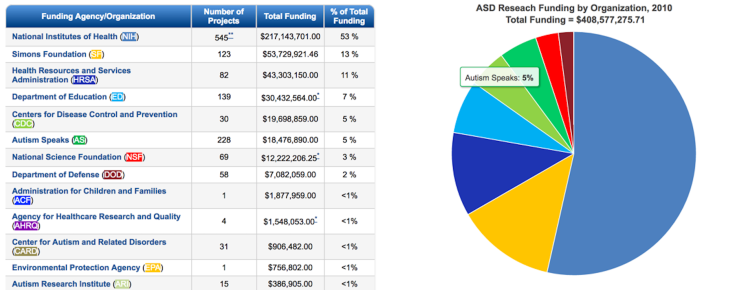
However, Autism Speaks has come under fire for other people on the Autistic spectrum and speaking over them. Up until recently, there was no person on the autistic spectrum on the board and once there finally was a representative, John Elder Robinson stepped down fairly quickly after a series of public relations including an outrageous
letter from the founder. In his resignation letter he wrote: “Autism Speaks is the only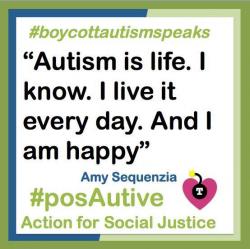 major medical or mental health nonprofit whose legitimacy is constantly challenged by a large percentage of the people affected by the condition they target.” He also lamented that Autism Speak was more of a support group for parents
major medical or mental health nonprofit whose legitimacy is constantly challenged by a large percentage of the people affected by the condition they target.” He also lamented that Autism Speak was more of a support group for parents
and grandparents of children with autism than it actually was for autistics.
Other people within the autistic community like Amy Sequenzia of the Autism Women’s Network have gone as far to argue (in this essay) that Autism Speaks is actually a hate group for demonizing the autistic community and promoting research of the genetic markers of autism so that parents may have the decision to abort an autistic child.
There is clearly a divide between the supposed goals of Autism Speaks of helping the Autistic community and the public outcry against them by the autistic community. It truly comes down to the contradictions between the manifest and latent effects of the institution. We will dive further into these contradictions with our in depth analysis of the manifest and latent of Autism Speaks.
The power exerted by large charities such as Autism Speaks is of the same form as that exercised by the penitentiary in a disciplinary society. On the surface, the disciplinary structure embodied by both the penitentiary and Autism Speaks operates with the goal of producing individuals that are useful to society. Foucault notes that “a penitentiary operation…will make of the penalty required by the offence a modification of the inmate that will be of use to society”(251); in other words, the prison presents its mission as the reform of criminals. This echoes statements made by Autism Speaks explaining their mission of making autistic individuals into productive members of society. The homepage of Autism Speaks displays the following image:
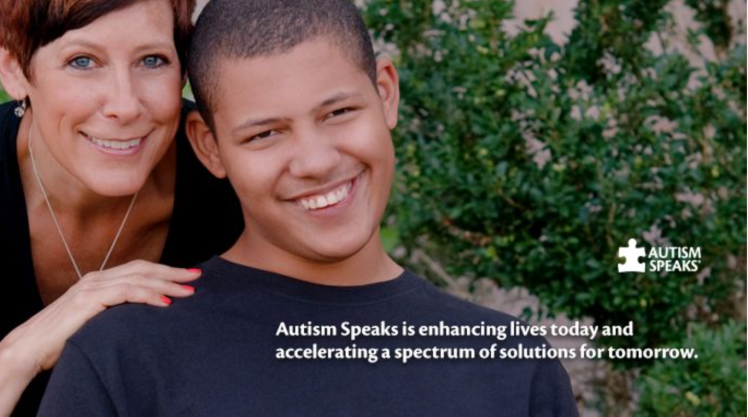
This rhetoric of reform is prevalent on Autism Speaks promotional material; the organization seeks to change the lives of autistic people to fit better with the expectations of their society.
This goal or normalization necessitates the establishment of a standard level of usefulness to which all members of society are held, thus allowing those in positions of authority to identify individuals that stray from this norm. Such norms are established using bodies of knowledge that are constituted through examination. Foucault describes this process of building knowledge of criminals in the penitentiary:
“The prison, the place where the penalty is carried out, is also the place of observation of punished individuals. This takes two forms: surveillance, of course, but also knowledge of each inmate, of this surveillance, of course, but also knowledge of each inmate, of his behavior, his deeper states of mind, his gradual improvement; the prisons must be conceived as places for the formation of clinical knowledge about the convicts (249).”
This formation of knowledge is parallel to the formation of knowledge by Autism Speaks. Once such a body of knowledge is established, it serves a resource on which methods of reform are based. Autism speaks pours money into learning about autism, as can be seen in the graph below showing the huge portion of their budget that goes toward research.
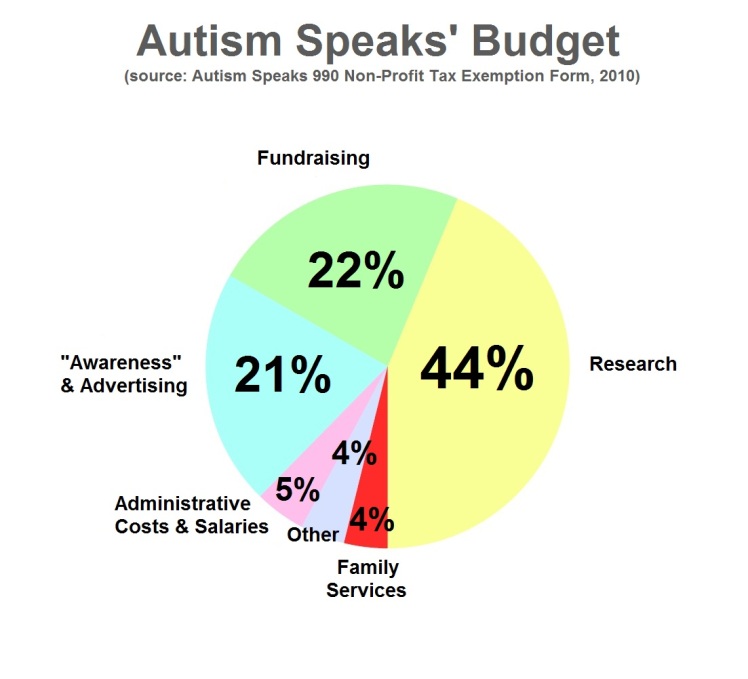
Autism Speaks asserts that it will use this knowledge to help autistic people overcome their differences and reintegrate into society.
Examination allows the social authority to determine what causes an individual to differ from the norm, (whether by having autism or committing a crime). The authority then puts structures in place whose manifest purpose is to help these people navigate a society where certain normality is expected. However, digging deeper into the actions of Autism Speaks reveals that while the manifest effect of the organization is furthering our understanding of autism, there is also a latent effect that arises from what they do with their research and the rhetoric which they use to promote autism awareness.
In Foucault’s argument about the prison, the latent force at work is the production of the “delinquent”. Foucault describes delinquency:
“It (prison) helps to establish an open illegality, irreducible at a certain level and secretly useful, at once refractory and docile; it isolates, outlines, brings out a form of illegality that seems to sum up symbolically all the others, but which makes it possible to leave in the shade those that one wishes to – or must – tolerate” (276-277).
The concept of delinquency emerges when an offender enters the prison. The delinquent is created by the prison system through the prison’s organizational technique. In other words, the prison system forms groups of delinquents based off of their similarities. A delinquent group shares a way of life and is separated from other prisoners because they are considered “abnormal” members of society (253). Delinquent groups are associated with the lower social classes in society. As stated previously, on the surface the prison seems to be a correctional institution that focuses on the reformation of an individual’s behavior. However, the latent force that operates within the prison is the production of delinquents. Society benefits from this latent operation because the “abnormal” group of society can be separated and managed. Additionally, the production of delinquents allows society to maintain power over the lower classes and avoid a large scale revolution.
In our modern society, a similar latent force is at work within the Autism Speaks charity. The charity has been criticized by many for stigmatizing people with mental disabilities while on the surface it seems like a well-functioning charity. Autism Spe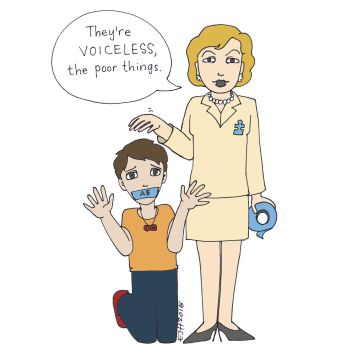 aks, using rhetorical language, classifies autistic kids as an “abnormal” group within society. The evidence for this claim is found on the charity’s website and in Suzanne Wright’s controversial statement. The co-founder stated at a conference, “Close your eyes and think about an America where three million Americans and counting largely cannot take care of themselves without help. Imagine three million of our own—unable to dress, or eat independently, unable to use the toilet, unable to cross the street, unable to judge danger or the temperature, unable to pick up the phone and call for help” (Daily Beast). In this dark scenario Wright compared autistic children to “not living”. They cannot function in society and are classified like delinquents as “abnormal”. The autism community and supporters of self-advocacy criticized Wright for associating autism with hopelessness and tragedy.
aks, using rhetorical language, classifies autistic kids as an “abnormal” group within society. The evidence for this claim is found on the charity’s website and in Suzanne Wright’s controversial statement. The co-founder stated at a conference, “Close your eyes and think about an America where three million Americans and counting largely cannot take care of themselves without help. Imagine three million of our own—unable to dress, or eat independently, unable to use the toilet, unable to cross the street, unable to judge danger or the temperature, unable to pick up the phone and call for help” (Daily Beast). In this dark scenario Wright compared autistic children to “not living”. They cannot function in society and are classified like delinquents as “abnormal”. The autism community and supporters of self-advocacy criticized Wright for associating autism with hopelessness and tragedy.
In addition to classifying autism as something “abnormal”, Autism Speaks establishes a normative standard to decide who is normal and who is not based on their body of knowledge. As stated earlier, they use their power-knowledge to depict autism as a disease that needs to be eliminated. Autism Speaks does not promote the notion of self-advocacy. As the president of the Autistics Self-Advocacy Network Ari Ne’eman stated, “We don’t want to be talked about as an epidemic or crisis to be combatte d. They view the goal of autism advocacy as a world in which autistic people do not exist. We think we should create a world where autistic people are included and can have a good quality of life” (Daily Beast). Ne’eman has also called on Autism Speaks to use their massive research efforts to develop “services, research into improved educational methodologies and things that have a practical impact on our lives.”(Elite Daily)
d. They view the goal of autism advocacy as a world in which autistic people do not exist. We think we should create a world where autistic people are included and can have a good quality of life” (Daily Beast). Ne’eman has also called on Autism Speaks to use their massive research efforts to develop “services, research into improved educational methodologies and things that have a practical impact on our lives.”(Elite Daily)
Autism Speaks primarily focuses on eliminating the problem of autism from society. They do not focus on autism and society coexisting, a coexistence embodied in the adjacent quotation by Dr. Temple Grandin, a professor at Colorado State University and a well known autism spokesperson.
The latent force at work in Autism Speaks is similar to Foucault’s claim about a prison having power to minimize disruptive crime. By having power, Autism Speaks minimizes disruptions in autistic people’s lives. Since autism has become more common, Autism Speaks tries to latently classify autism as “abnormal” in order to prevent massive disruptions in society. Foucault states that certain biographical traits of offenders become criminalized. This results in the isolation and stigmatization of groups. Discipline leads to the shift from the offender to the delinquent, as the institution of Autism Speaks turns autistic kids from people who do things differently to people who can’t participate normally.

While Autism Speaks professes to benefit the autistic community, we see that their rhetoric also produces the latent effect of “othering” autistic people. An awareness of this bilevel effect can influence the way we interact with powerful institutions. In a disciplinary society, it is the subscription of the public to certain disciplinary structures that allows institutions such as Autism Speaks to command such power. As members of the public, we can perform our own examination of the practices of powerful charities in order to determine which ones we should support. Our investigation of Autism Speaks supports Foucault’s argument that the power-knowledge structure embodied in the prison system has now been integrated into a more unexpected social institution: the charity.
This is a really interesting way to look at a disciplinary structure, and the manifest vs. latent brings up a division of society that Foucault doesn’t really engage with directly: those with power/authority/voice and those without. In purporting to speak for a silenced group, this organization really reinforces the normative standards of the collective. In other words, the charity is a particularly malicious form of power-knowledge creation, because it’s veiled in morality (we feel good by engaging with it). So my question is, what does an ideal form of Foucaultian discipline look like to those who protest Autism Speaks’ silencing and othering of autistic people, given that disciplinary structures are ubiquitous? In other words, can open-mindedness be enforced by a disciplinary structure, or is that inherently contradictory?
LikeLike
I thought this was a super interesting post. Knowing about Autism Speaks and the controversy that’s surrounded it, it’s really interesting to see you make this comparison between Foucault and the organization which, at least to me, wasn’t readily apparent. I think you did a really interesting job explaining your comparison to the prisoner and the effect of Autism Speaks on autistic persons – or at least the intended effect of “normalizing” or eliminating the effects of autism entirely from visible society rather than embracing and encouraging those people affected by it. I do think Foucault would agree, especially with your last statement, that power-knowledge has pervaded every sect of our life, even those unexpected institutions like charity, but I think that this is something that’s become very apparent especially in recent years.
LikeLike